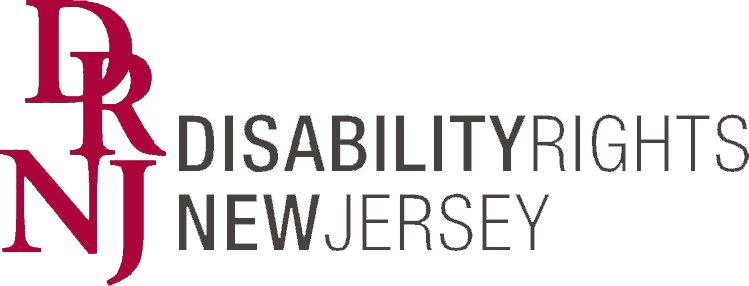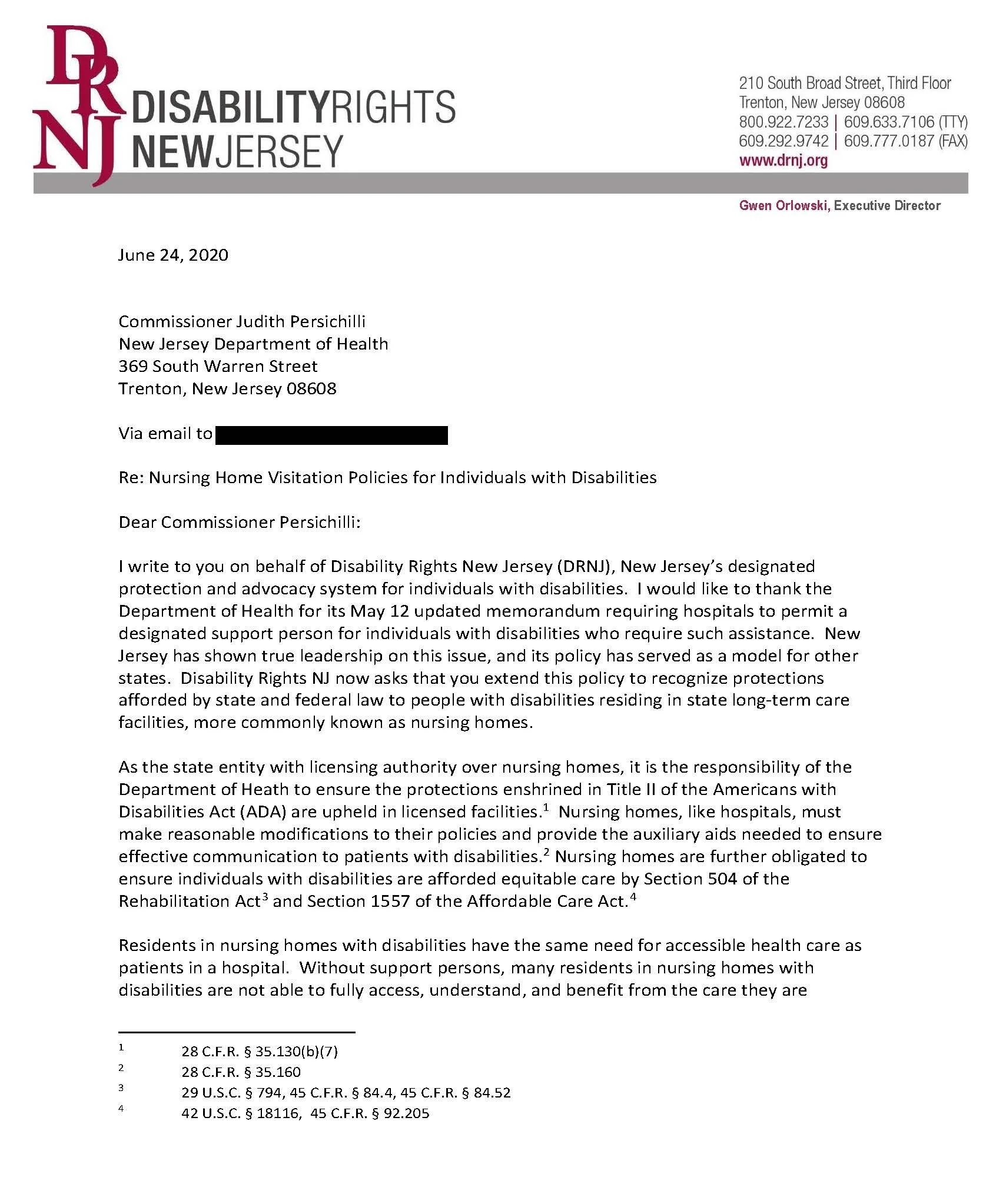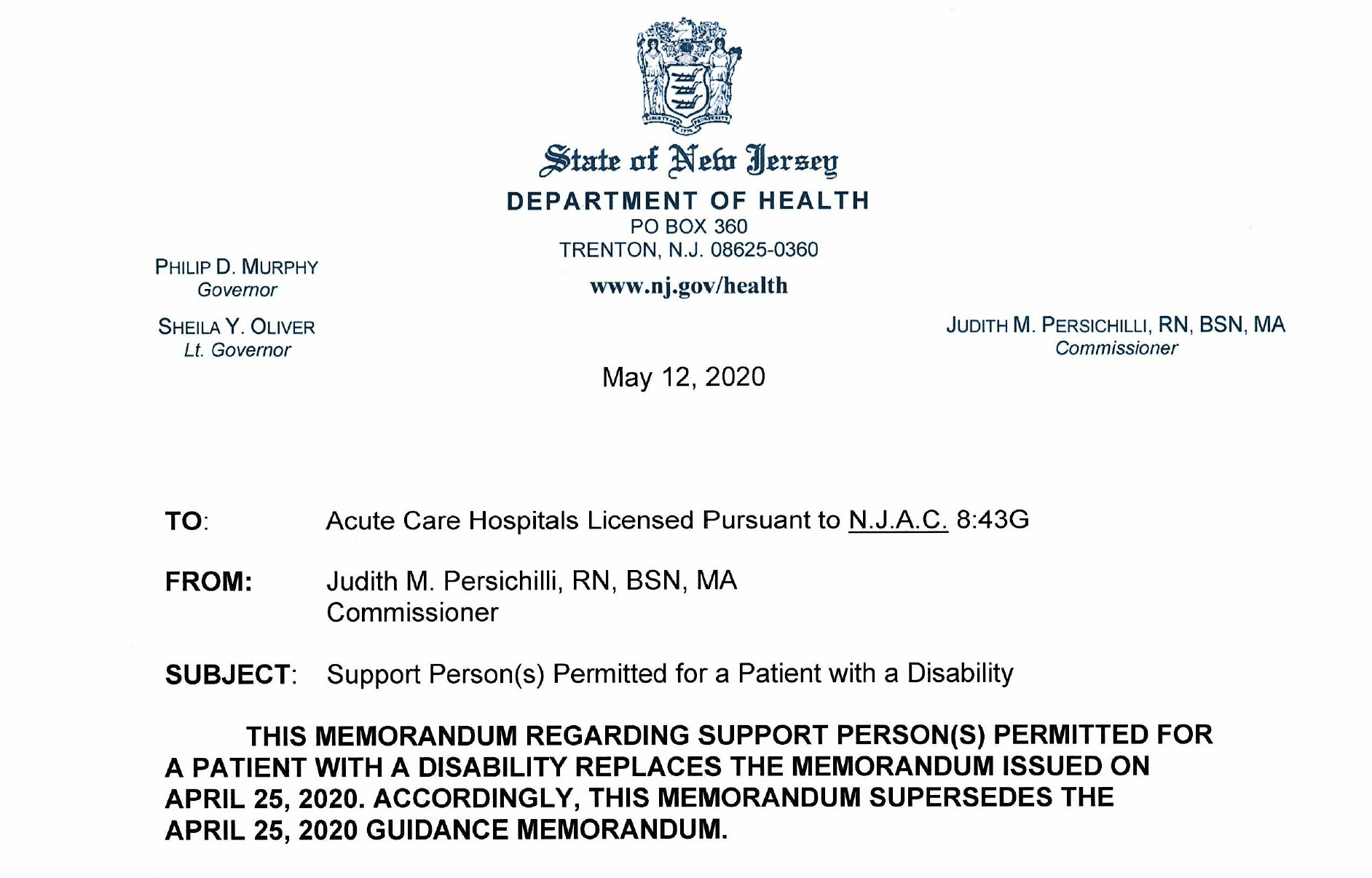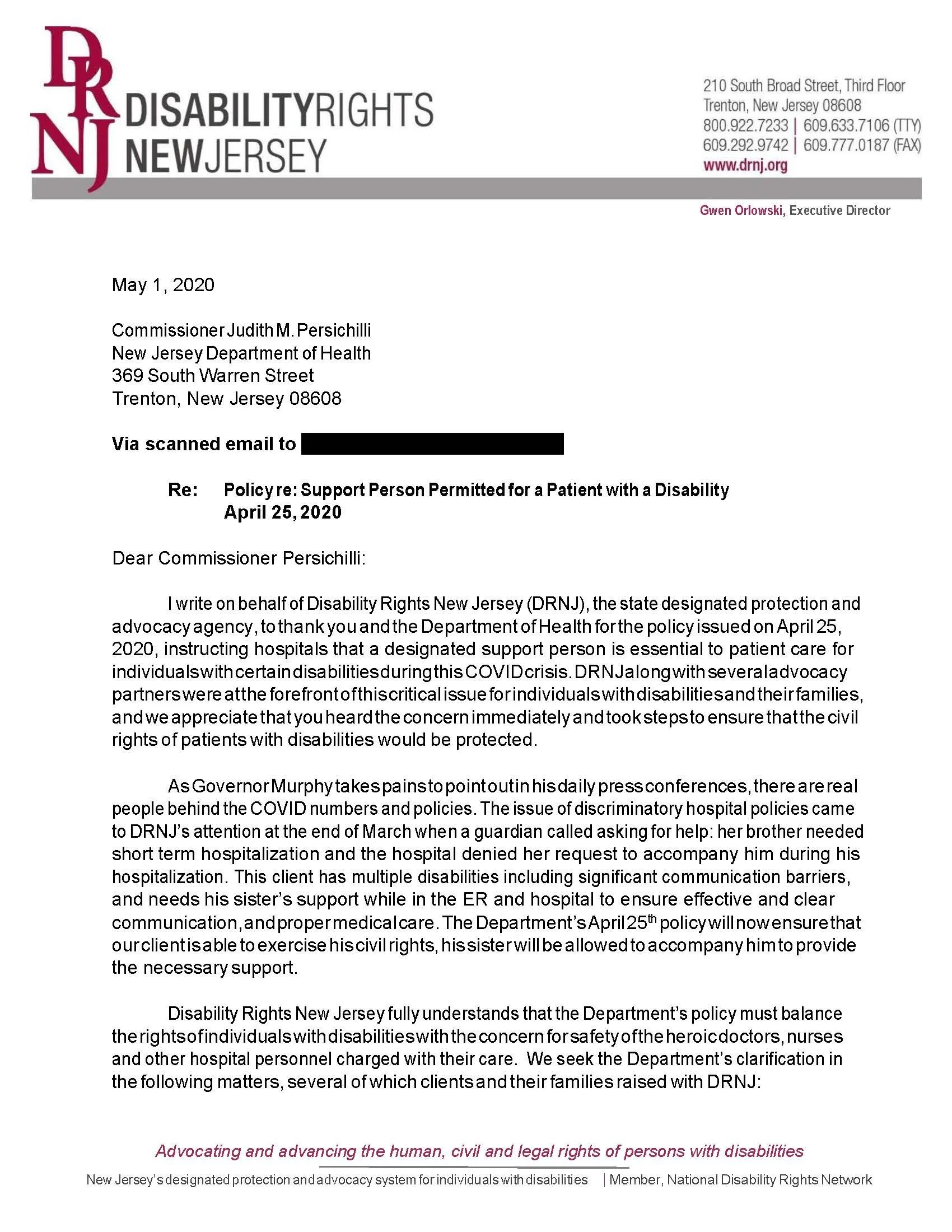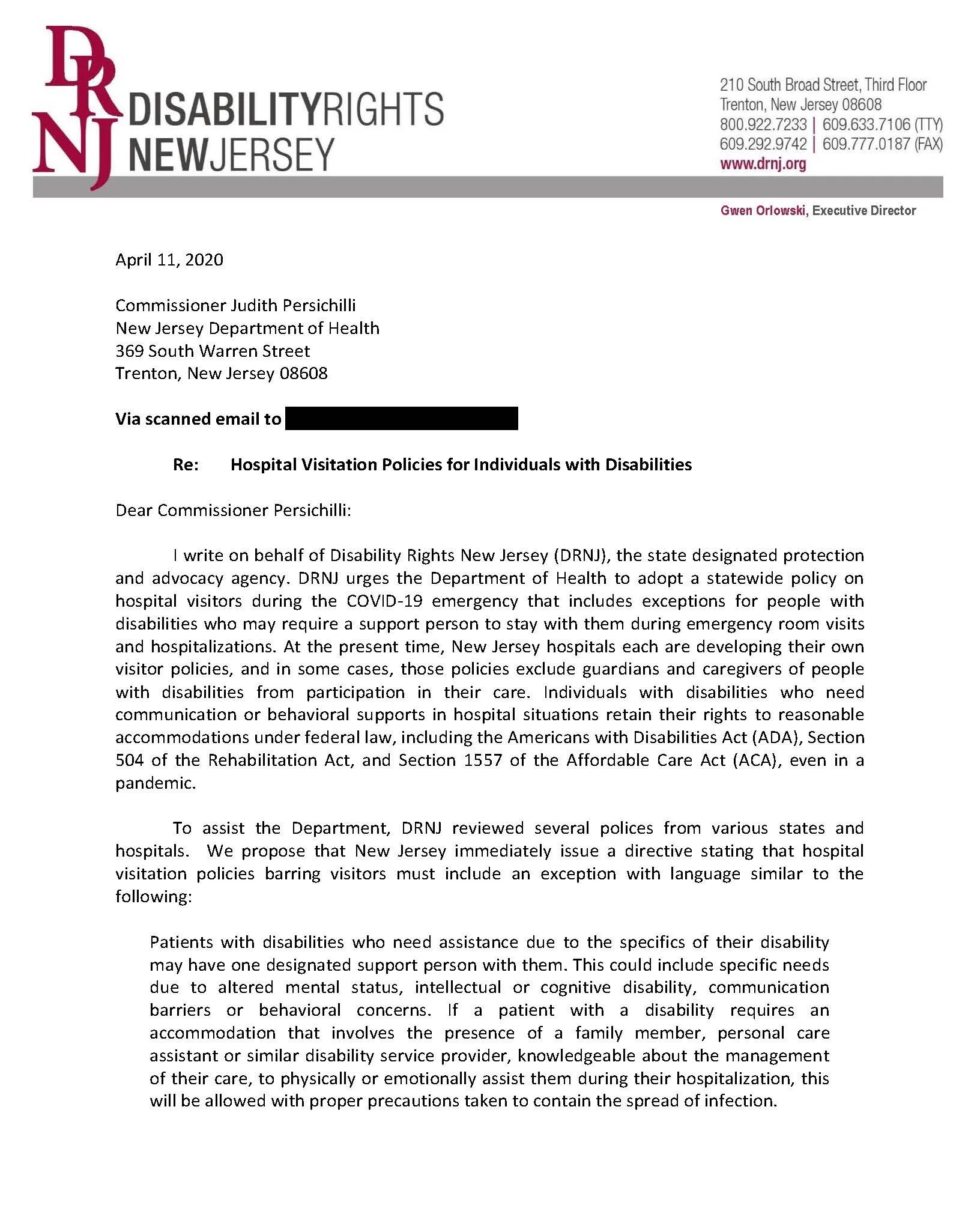Hospital Visitation Policies
June 24
In a letter sent June 24, 2020 to Department of Health Commissioner Judith M. Persichilli, Gwen Orlowski, Executive Director of Disability Rights New Jersey asked the Department of Health to extend this policy to people with disabilities residing in state long-term care facilities, more commonly know as nursing homes.
Disability Rights NJ Sends Letter to DOH to Extend Support Person Policy to Nursing Facilities
May 12
The New Jersey Department of Health updated its April 25, 2020 guidance for acute care hospitals to allow persons with disabilities to have a support person designated as essential and exempted from hospital “no visitor” policies. Here is an overview of the changes:
To whom does this guidance apply?
Advocacy groups requested that the guidance be broadened to include certain individuals with physical disabilities. The new guidance does not include those individuals, but does expand language in the original guidance, which included “patients…where the disability may be due to altered mental status, intellectual or cognitive disability, communication barriers or behavioral concerns.” The new guidance adds “cognitive impairment including dementia” and “those patients with a developmental disability as defined in N.J.A.C 10:44A and those with a psychiatric diagnosis receiving services pursuant to N.J.A.C. 10:37E”
Where can the support person physically be with the individual?
The new guidance states that the support person can be with the patient in both the emergency room and during hospitalization, regardless of the reason of the hospitalization. However, the new guidance adds “for patients for whom a support person has been determined to be medically necessary.” This was not a criterion in the original guidance and there is no further information about how that is determined. Access to other areas of the hospital is still limited.
Who qualifies as a support person?
The new guidance still defines a support person as a designated person who can be a family member, personal care assistant, or another disability service provider knowledgeable about the patient’s care. The new guidance clarifies that for prolonged hospitalizations, the patient or family/caregiver can designate two support people but still only one person can be present at a time. The new guidance also discourages individuals age 70 or older from being designated as a support person due to the increased risk of COVID-19 infection.
Can the support person leave?
The original guidance stated that a support person was not permitted to leave and re-enter the hospital. DRNJ asked the Department for some clarification about that requirement and the new guidance states that a support person cannot leave and re-enter the hospital without being re-screened. We read this to allow a support person to leave the hospital, but recognize that hospitals are allowed to encourage support persons to remain, if possible, in the interests of preserving PPE.
Can hospitals restrict the presence of a support person if they determine they have a shortage of PPE?
Yes. Although DRNJ requested that the guidance be changed to allow support persons to bring their own PPE if the hospital determined a shortage, that language remains the same in the new guidance.
Questions concerning this guidance can be directed to Ms. Jean DeVitto, Executive Director, Certificate of Need and Healthcare Facility Licensure program, at: CNL.InquiryWaiversIssued@doh.nj.gov
May 1
Followup Letter to Commissioner Persichilli on the Support Care Issue with Clarification
April 25
The NJ Department of Heath (DOH) issued the hospital visitation policy for people with disabilities effective April 25, 2020. DOH now considers a designated support person essential to patient care people with disabilities. As a result, hospitals must allow a designated support person to be with the individual during hospitalization.
We encourage family members to print a copy.
Disability Rights New Jersey collaborated with the Governor's Office, DHS and DOH to advocate for this important policy.
April 24
As of April 24th, NJ DOH has not yet issued a guidance for visitation, however Oregon Health Authority recently adopted a better hospital visitation policy providing access to:
Guardians or caregivers of patients who need assistance due to their disability if in person visitation is necessary to:
Facilitate treatment
Ensure the safety of the patient or facility staff
Friends or family members who must accompany a patient to the emergency department or for a procedure, when no facility staff are available to provide that service.
April 11
In a letter sent April 11, 2020 to Judith M. Persichilli, Commissioner of New Jersey Department of Health, and including Governor Phil Murphy, Disability Rights New Jersey addressed the concerns of individuals with disabilities, and their families, where hospitalization is necessary during the COVID-19 crisis. In many cases, it is critical for a support person such as a family member/loved one, guardian, DSP, PCA to accompany individuals with disabilities during hospitalization, due to communication or behavioral limitations. Under the Americans with Disabilities Act (ADA), Section 504 of the Rehabilitation Act, and Section 1557 of the Affordable Care Act (ACA), it is their civil right to have reasonable accommodations, including a support person, even during a pandemic.
Hospitals across the state of New Jersey, however, are each developing their own visitation policies, and in some cases, excluding guardians and caregivers of people with disabilities from participation in their care in order to mitigate the spread of the virus.
Executive Director, Gwen Orlowski, of Disability Rights New Jersey, proposed that New Jersey immediately issue a directive stating that hospital visitation policies barring visitors include an exception for patients with disabilities who need assistance due to the specifics of their disability. To ease the burden on the designated support person, she recommended an allowance of two support persons, with only one present at a time, during hospitalization.
Disability Rights New Jersey looks forward to timely and specific guidance from the Commissioner that reinforces the rights of people with disabilities in a hospital. You can read the full letter to the Department of Health, by clicking the image above.
Due to COVID-19 Hospital Visitation Policies Exclude Caregivers of People with Disabilities:
What We're Doing to Change the Policies
Important Links to Provide You with Additional Information on Hospital Visitation Policies During the COVID-19 Crisis
Visitation Policy Guidance from Other Locations
